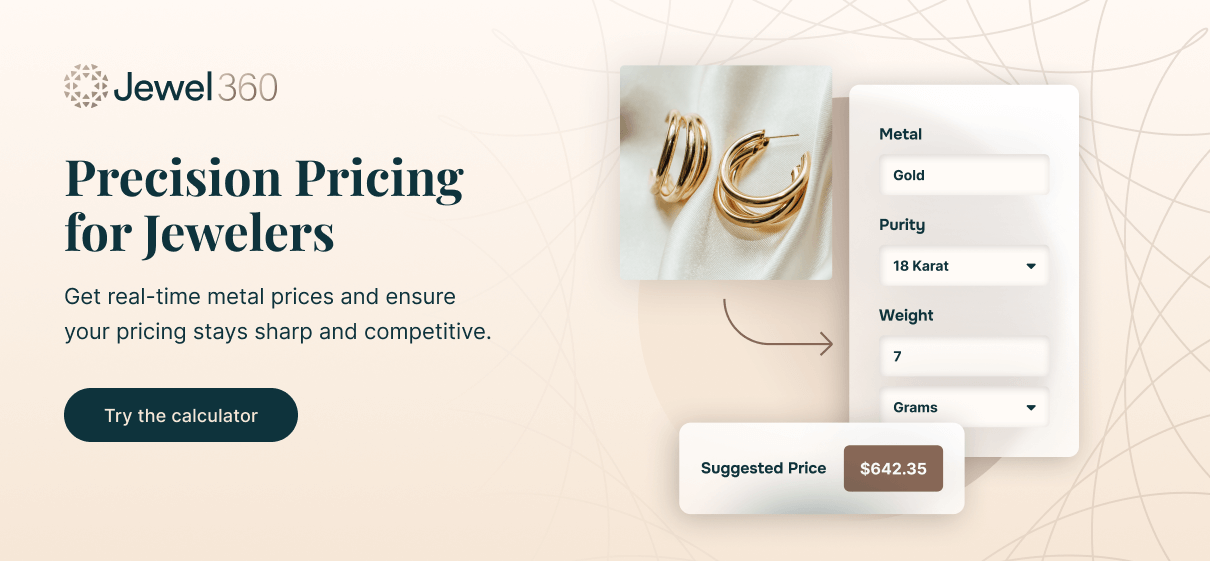
When a customer walks into your jewelry store looking for the perfect engagement ring, the last thing you want is to look disorganized and unprofessional, wrestling with your technology to check what stones are in stock.
But if you’re not using the right jewelry software for retailers, you might end up facing issues like this every day.
Your jewelry business faces challenges that clothing stores, electronics retailers, and other merchants don't encounter. If you want to manage your store efficiently, you can’t use the same point of sale (POS) solution as the boutique down the road.
Instead, you need to find jewelry store-specific software. But what should you be looking for when choosing the right software for your store? This blog covers 12 essential features every jewelry store owner needs from their software solutions, plus we’ll cover four top-tier options for software providers.
Why Jewelry Retail Demands Specialized Software
As we mentioned briefly above, running a successful jewelry store isn't like managing any other retail business. Let’s take a look at some of the unique features of jewelry retail and why these challenges require some specialized features in your software solutions:
- High-value, low-volume sales: Unlike typical retail, jewelry stores handle fewer transactions but significantly higher dollar amounts.
- Individual item uniqueness: No two pieces are identical. You need to track specific characteristics like cut, clarity, carat weight, and metal purity for each piece in your store.
- Complex customer relationships: Jewelry purchases are often emotional, tied to life events like engagements and anniversaries. Successful jewelers need to provide an incredible customer experience to win loyal business.
- Security and insurance requirements: High-value merchandise requires specialized coverage and protection protocols that general retail doesn't have.
Generic retail software doesn’t have the features you need to handle the granular details of your inventory, advanced customer relationship management (CRM), or the tools for additional services like insurance and appraisals.
Understanding these unique challenges is the first step toward choosing software that actually works for your business. With this information in mind, let’s cover the 12 features to consider when searching for the right jewelry software for your retail store.
1. Serialized Inventory Tracking
Your inventory is more complex than the average store's, so you need more advanced inventory management features from your software. Serialized inventory tracking assigns unique identifiers to each individual piece, capturing detailed descriptions, specifications, and history for each item.
Related Read: Jewelry Inventory System: 3 Top Options for Your Store
This feature matters because jewelry mix-ups can be costly and embarrassing. When a customer returns for a repair or warranty service, you need to quickly locate their exact piece and verify its authenticity.
Serialized tracking also speeds up insurance claims by providing detailed documentation of each item's characteristics and value. In short, if you need to get into the nitty-gritty details when it comes to inventory (as most jewelry stores do), serialized inventory tracking is a must-have.
2. Metal & Stone Specifications Management
Next, you want inventory features that track jewelry attributes like metal purity, diamond clarity, cut grades, carat weights, and gemstone certifications. Rather than cramming these details into generic product descriptions, look for a software solution that lets you track this information in a format you can report on.
When customers ask about a stone's clarity or metal composition, you want to be able to provide instant, detailed answers. This precision in the tracking process streamlines appraisal processes and insurance documentation. You’ll also have an easier time with pricing and consistency when you can see all this data at a glance.
3. Multilocation Inventory Synchronization
If you only run one brick-and-mortar store, you might not think this feature applies to your shop, but multilocation inventory management is about more than managing a chain of stores. You want a system that can track inventory across all your business locations — the showroom floor, secure vault, repair workshop, and online channels.
This feature helps you provide better customer service and optimize your display case usage. The real-time updates prevent lost sales from inaccurate availability information. In other words, you'll never again have to sheepishly tell a customer that a piece they saw online was actually sold yesterday.
Related Read: Jewelry Customer Management: 10 Tips & Tools
4. Layaway Management
Jewelry stores sell high-value items. As a result, you may have customers who can’t afford to pay in full upfront. The solution? Payment plans or layaway management solutions.
The right jewelry software helps you track payment schedules, send automated reminders, and manage the status of reserved items until they're fully paid off. The bonus here is you can remove manual paperwork and follow-up from the process, making it easier to manage for both you and the customer.
Related Read: Comparing Jewelry Store POS Systems for Jewelry Retailers
Layaway programs provide some great opportunities to expand your customer base. They also improve cash flow by providing regular payment streams. Plus, well-managed layaway programs build customer loyalty and often lead to additional purchases down the line.
5. Trade-In & Consignment Handling
If you plan to accept trade-ins or sell pieces on consignment, you need a software solution with the right features. Choose jewelry software for retailers with built-in valuation tools to help standardize appraisals. You also need tracking systems to manage ownership transfers and commission structures for consigned items.
Trade-ins and consignment sales are incredible options for stores looking to expand their customer base to include budget-conscious shoppers. These programs are a headache to manage manually, but often lead to higher-value sales as customers use trade-in credits toward premium pieces. When your software allows you to set up a streamlined process, it’s easier to say "yes" to more trade-in opportunities.
6. Gift Registry & Wishlist Management
Gift registries and wishlists allow customers to save favorite pieces and share them with family and friends. Consider implementing a system that tracks registry items, manages purchases, and enables customers to share those lists with their entire social network.
Why offer registries and wishlists? These offerings can boost your average transaction value because family and friends often coordinate and pool funds to purchase a high-ticket item. Registries also provide valuable insights into customer preferences and trending styles.
Related Read: Attract More Customers With These 6 Jewelry Store Event Ideas
7. Repair & Work Order Management
Repair services are an incredible add-on for modern jewelry stores. To manage repairs effectively, you need work order management tools to track custom jewelry orders and repairs, from the consultation meeting to completion and customer pickup. The right solution manages timelines, captures photos of the product, and provides status updates that keep customers informed throughout the process.
Efficient work order management keeps customers happy and reduces your store’s liability. Documenting every step of the repair process and communicating clearly with your customers prevents misunderstandings about work performed.
For example, Jewel360 automatically sends customers notifications when their repairs are complete, eliminating the need for manual follow-up calls.
8. Appraisals Management
Next, look for a tool with appraisal management features. Incredible appraisal management systems maintain detailed documentation of each appraisal, including photos, certifications, and valuations. These tools can also track when customers need updated appraisals for insurance purposes.
Professional appraisal management is another incredible service for jewelry stores. It keeps customers happy, builds credibility, and helps you comply better with insurance requirements. Organized documentation makes giving customers copies of their appraisals easy and helps insurance companies process claims quickly.
9. Advanced Reporting & Analytics
If you’re regularly making business decisions based on gut feeling, you’re flying blind. Instead, you need a POS system with advanced reporting and analytics to help you make the best decisions for your store.
Jewelry-specific reporting goes beyond basic sales data to include metrics like gross margin return on investment (GMROI), inventory turn rates, and seasonal trend analysis. These reports help you understand which product categories perform best and identify opportunities for improvement and seasonal trends.
10. Customer Relationship Management
Jewelry-focused CRM systems track detailed purchase history, style preferences, and important dates like anniversaries and birthdays. A great POS system also enables automated follow-up campaigns and personalized communication.
Strong customer relationships are crucial in the jewelry business, where purchases are infrequent but high-value. Tracking preferences helps you suggest relevant pieces, while anniversary reminders help you create natural opportunities for additional sales.
Related Read: 7 Unique Jewelry Store Email Marketing Ideas
Investing in a tool with strong CRM features helps you keep your store top of mind for your customers (without being pushy).
11. E-Commerce Integration
A great store website is a “must” in the modern age. That means you need an e-commerce platform in addition to your brick-and-mortar business. And that means you want to invest in jewelry software that synchronizes your online and offline operations and inventory.
You need omnichannel consistency. Customers expect to be able to check in-store inventory online and expect the information on your website to be real-time.
A fully-integrated system also helps you provide a consistent experience, regardless of how someone shops with you — plus, it allows staff to see a customer’s online and in-store purchases in one place.
12. Enhanced Security & Insurance Integration
Last but not least, your jewelry software needs advanced security features. These features are critical for protecting your inventory data and customer information. Look for solutions with encryption, access controls, and automatic audit trails.
Jewelry stores also often need to integrate with insurance partners. These features streamline coverage applications and claims processing, and allow customers to protect their new purchases without having to hunt for insurance on their own. For example, Jewel360's integration with Jewelers Mutual allows customers to purchase care plans directly at the point of sale.
Top Jewelry Software Providers Comparison
When searching for the right jewelry store management software, you'll find several strong options in the market. Each platform offers unique strengths, from specialized jewelry features to general retail capabilities adapted for jewelry stores.
| Provider | Best For | Key Strengths | Starting Price | Specialty Focus |
| Jewel360 | All-in-one jewelry solution | Appraisals management, work orders, Jewelers Mutual integration, automated marketing | Custom pricing | Purpose-built for jewelry retail |
| wJewel | Established jewelry retailers | Strong POS capabilities, multistore support, RFID integration, QuickBooks integration | $125/month | Comprehensive jewelry business management |
| The Edge | Inventory-focused operations | Advanced inventory management, detailed reporting | $4,600, one-time | Jewelry-specific analytics and inventory control |
| Lightspeed Retail | Multilocation or enterprise retailers | Appraisals management, work orders, Jewelers Mutual integration, automated marketing | $89/month | General retail adapted for jewelry |
So, which of these options is the best fit for your store? The answer depends on your priorities. Jewel360 offers the most jewelry-specific features on the market and includes seamless integrations like appraisal management and insurance partnerships. When making your decision, consider your budget, growth plans, and which features matter most to your daily operations.
The Best Jewelry Software for Retailers
Your jewelry store deserves software that understands the ins and outs of your business. Generic retail solutions simply can't deliver the specialized functionality that drives jewelry store success.
The right jewelry software transforms your operations from the ground up. It eliminates the frustration of inventory mix-ups, streamlines customer communications, and provides the detailed tracking that insurance companies and customers expect.
The wrong software can gum up your operations and leave your customers frustrated.
You can't afford to settle for software that treats your unique jewelry pieces like generic retail products. Your business demands better, and your customers deserve the professional experience that only specialized jewelry software can deliver.
Ready to see how Jewel360's specialized features can boost your jewelry business? Schedule a demo today.




 by
by .png?width=101&height=101&name=Group%201%20(1).png)








